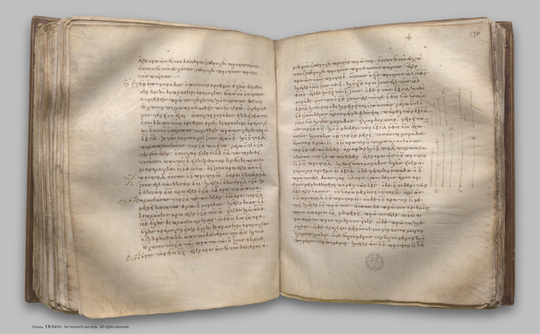Euclid wrote
the Elements around 300 BCE. It is, arguably, the most influential book in the history of mathematics. It is divided into 13 Chapters (or "Books") and deals (in modern terminology) with Geometry, plane and solid, Algebra, and Number Theory. It represents the pinnacle of pure thought which clearly shows the achievement of a successful civilization more than 2000 years ago.
For centuries, the Elements remained the basis of Mathematics and Sciences.
We do not possess the original work. The oldest surviving copy dates from the year 888 CE. It was copied by someone known as "Stephen the Clerk" and sold to
Arethas of
Patras, one of the most scholarly theologians of the Orthodox Church. Despite the custom to destroy ancient works, Arethas preserved and propagated a few. Besides Euclid, he was also interested in Plato and Lucian and produced commentaries of their works. Arethas served as Archishop of Caesarea and was a disciple of
Photius I, Patriarch of Constantinople (a scholar himself, notably known for the conversion of Slavs into Christianity and the introduction of the
filioque which led to the split between the Catholic and Orthodox churches). I am not aware of what immediate influence Arethas' work had: did someone study Euclid's Elements? Did it produce further scholarly works? Was it considered, simply, a curiosity? It is clear that Arethas himself was not satisfied with the status quo of the church, i.e. the despising of Greek and Latin scientific and secular works, and played a role in reinstating their importance.
The long-term influence of Arethas' copy needs, of course, no comment. Without it, how would
Newton's Principia (if it existed) look like?
Arethas' copy of Euclid's Elements can be found in
Oxford's Bodleian Library. It has been there since 1804. The
Clay Mathematical Institute has produced a high-quality
electronic copy of it. The electronic edition contains a superb reproduction of the original text (as written by Stephen). It is hard to read because the fonts used by Stephen belong to the so-called "μικρογράμματη γραφή [mikrogrammati grafi]" or "small-letter script". However, we can also find, on the Clay Institute site, a version in modern Greek fonts, which is easy to read and is also easily understood by the modern Greek speaker, along with translation in English.
Here is an example of a number-theoretic contribution from the Elements (Book 9, Section 36):
Ἐὰν ἀπὸ μονάδος ὁποσοιοῦν ἀριθμοὶ ἑξῆς ἐκτεθῶσιν ἐν τῇ διπλασίονι ἀναλογίᾳ, ἕως οὗ ὁ σύμπας συντεθεὶς πρῶτος γένηται, καὶ ὁ σύμπας ἐπὶ τὸν ἔσχατον πολλαπλασιασθεὶς ποιῇ τινα, ὁ γενόμενος τέλειος ἔσται.
If as many numbers as we please beginning from a unit be set out continuously in double proportion, until the sum of all becomes prime, and if the sum multiplied into the last make some number, the product will be perfect.
In modern mathematical lingo, this says the following:
Let n be a positive integer. Consider the numbers 1, 2, 4, 8, ..., 2n-1, that is, the first n powers of 2. Let Sn be their sum. Assume that Sn is a prime number. Then 2n-1Sn is a perfect number (i.e. it is the sum of its proper divisors).
The proof can be found
here.
 Comment
Comment: We can easily see that
Sn =
2
n-1. We assume that this is a prime number. (Prime numbers of this form are [now] known as Mersenne primes.) Based on this, we conclude that 2
n-1Sn is a perfect number. In other words, we have a "formula" for perfect numbers:
2n−1(2n − 1) is perfect if 2n − 1 is prime.
This works for n=2, 3, 5, 7, e.g.,
2
6(2
7 − 1) = 8128.
The divisors of 8128 are:
1, 2, 4, 8, 16, 32, 64, 127, 254, 508, 1016, 2032, 4064.
Their sum is 8128.
P.S. A converse (due to
Euler) to Euclid's proposition is also true. Namely, if an even number is perfect then this number must be of the form 2
n−1(2
n − 1).




